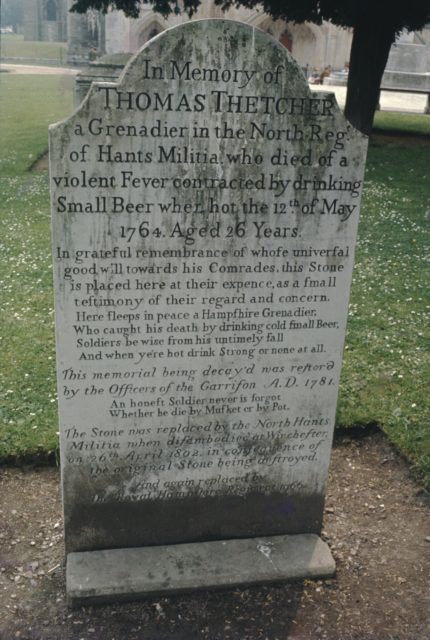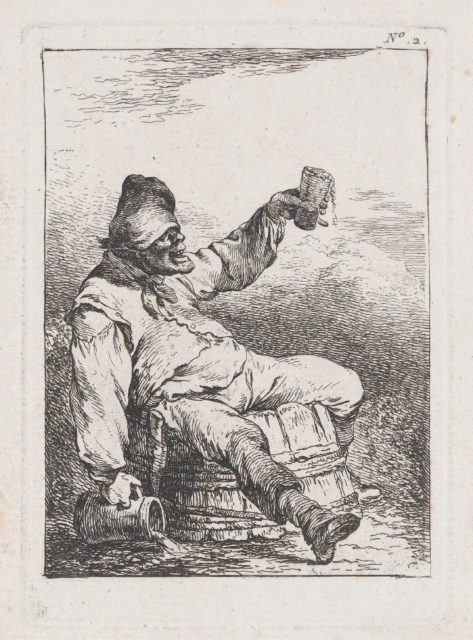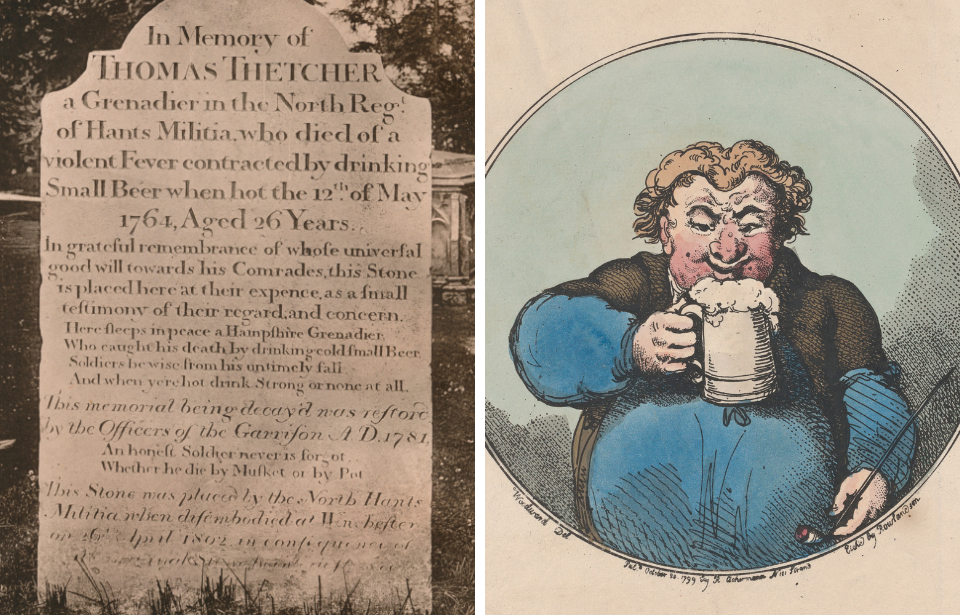A chance encounter with a headstone offering a word of advice sparked a domino effect that led to thousands of live being saved. Taken as an example of what can happen when one drinks too much, it may have a different meaning, but its resonance gave way to the creation of the worldwide organization, Alcoholics Anonymous.
Thomas Thetcher’s headstone

In the 18th century, there lived a grenadier with the North Hants Militia named Thomas Thetcher. Thetcher was a well-respected soldier within his unit, but his life was cut short on May 12, 1764, at the age of 26. His untimely death was honored by his fellow soldiers, who commissioned a headstone that spoke to what had killed the grenadier.
Despite his position, it wasn’t battle that caused Thetcher’s demise – it was a drink.
His grave is the cemetery at Winchester Cathedral, and the inscription on the headstone reads, “In Memory of Thomas Thetcher a Grenadier in the North Reg. of Hants Militia, who died of a violent Fever contracted by drinking Small Beer when hot the 12th of May 1764. Aged 26 Years.”
It continues, “Here sleeps in peace a Hampshire Grenadier / Who caught his death by drinking cold small Beer / Soldiers be wise from his untimely fall / And when ye’re hot drink Strong or none at all.”
A resonating interaction with the headstone’s message

Nearly two centuries later, another soldier unknowingly found his way to Thomas Thetcher’s grave. In the midst of the First World War, Bill Wilson, of the US Army’s Coast Artillery, and his unit were making their way to the Western Front. When he came across Thetcher’s headstone, he read its inscription, which must have, in some way, resonated with him.
Following the close of the war, Wilson became a successful businessman, but his career was plagued by his drinking. He became so controlled by his alcoholism and his health so compromised that he was told he’d either die by the drink or have to be locked away to survive.
Contrary to these prophecies, Wilson and a group of fellow alcoholics found their own way to achieve sobriety. He wrote about his experiences in the influential 1939 book, Alcoholics Anonymous, and also co-founded an organization by the same name.
Within the book, Wilson recalled coming across Thetcher’s headstone, calling it a major influence on his journey toward recovery. He described it as an “ominous warning which I failed to heed.” His book went on to sell more than 30 million copies and became known as one of the top 100 most influential books since 1923.
Thomas Thetcher’s cause of death is unknown

Although the inscription on Thomas Thetcher’s headstone is written to imply he died from drinking, there’s no evidence of this being true. Instead, medical professionals have agreed it’s more likely he passed away from fever caused by cholera or typhoid, which he’d contracted from a contaminated beer. Some even suggest he died by “deglutition syncope” – fainting when swallowing.
During the 18th century, people mainly drank “small beer,” a weak brew that was safer to drink than water, which often hosted a variety of diseases. However, it may very well have been that these illnesses weren’t entirely killed off in the batch Thetcher drank. It’s ironic because, had it been a stronger beverage, the grenadier would have likely survived.
More from us: Who Poisoned the Cast of ‘Titanic’ With PCP on the Last Day of Filming?
Thetcher’s headstone has become a symbol of Alcoholics Anonymous, and many within the organization travel to visit the grave that inspired the movement. Unfortunately, it became badly weathered, and was replaced in both 1802 and 1966. The original is now on display at the Royal Hampshire Regimental Museum in Winchester.
